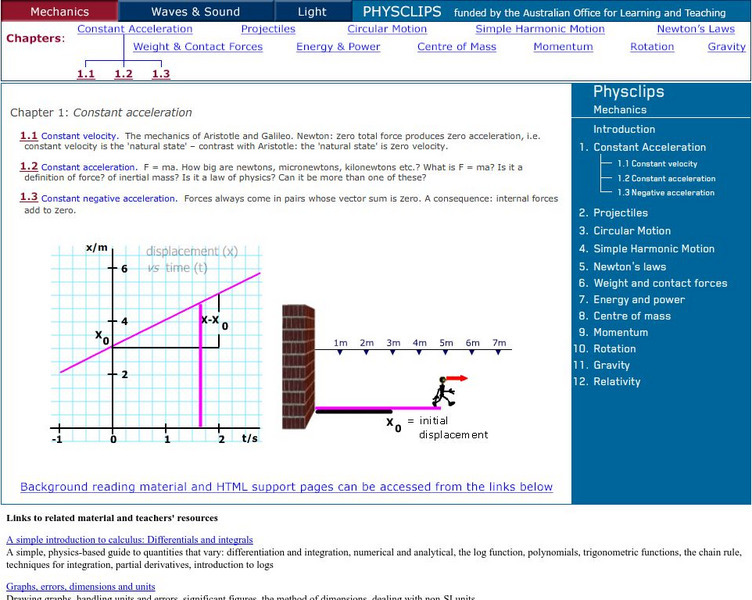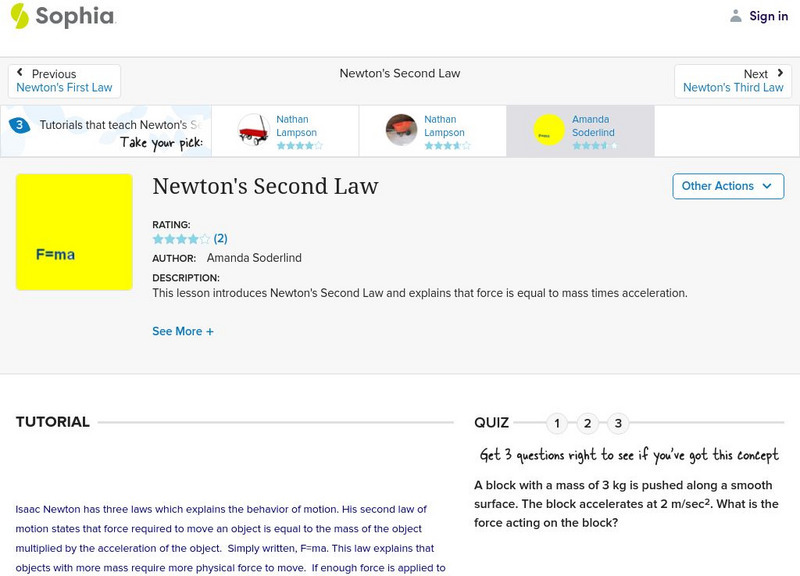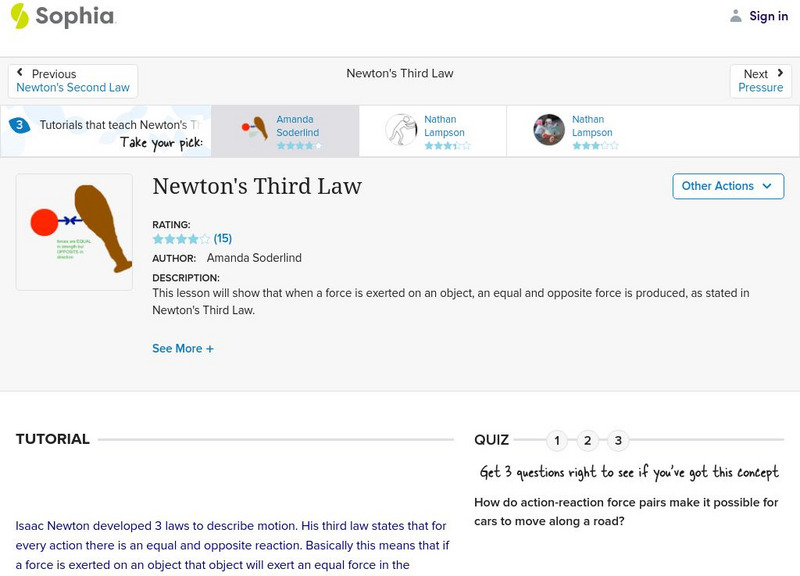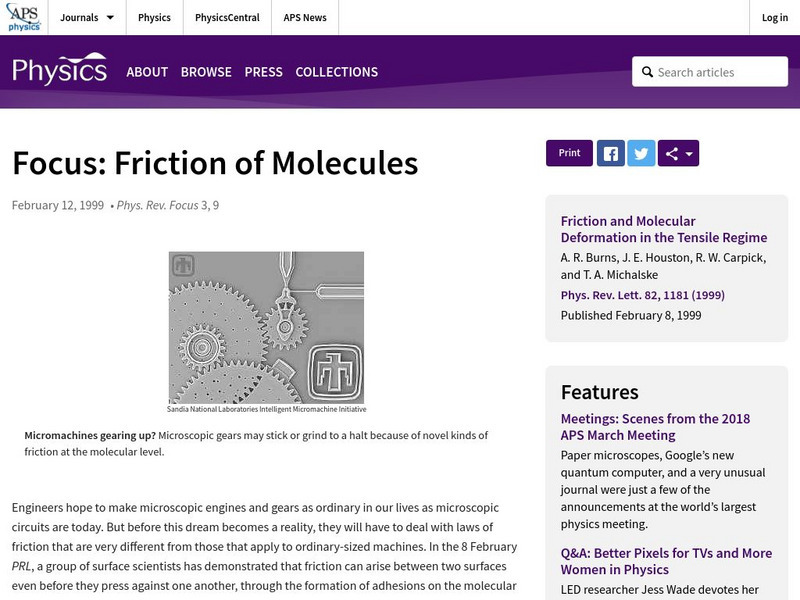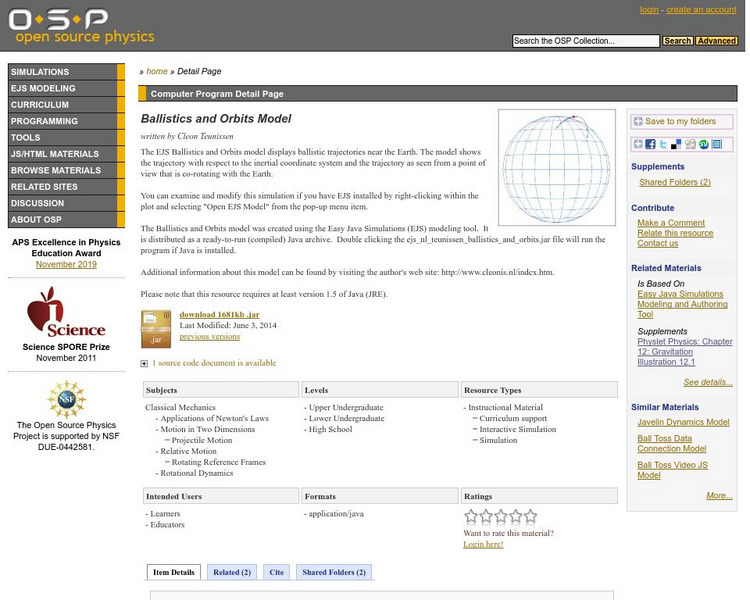Physics Classroom
The Physics Classroom: The Car and the Wall
The Physics Classroom uses an animation of a car crash to lead its discussion on the law of inertia.
TeachEngineering
Teach Engineering: Rockets
This unit teaches students how and why engineers design satellites to benefit life on Earth as well as allows students an opportunity to explore motion, rockets and rocket motion. Students discover that the motion of all objects...
University of New South Wales (Australia)
University of New South Wales: School of Physics: Physclips
Physiclips thoroughly presents mechanics concepts with animations and film clips.
Annenberg Foundation
Annenberg Learner: Colliding Cars
Try to predict what will happen in three different bumper car collisions. For each collision, you'll be shown two possible outcomes.
Sophia Learning
Sophia: Newton's First Law: Lesson 1
This lesson introduces Newton's First Law, that inertia causes objects at rest to remain at rest, and objects in motion to remain in motion. It is 1 of 3 in the series titled "Newton's First Law."
Sophia Learning
Sophia: Newton's First Law: Lesson 2
This lesson introduces Newton's First Law, that inertia causes objects at rest to remain at rest, and objects in motion to remain in motion. It is 2 of 3 in the series titled "Newton's First Law."
Sophia Learning
Sophia: Newton's Second Law: Lesson 2
This lesson introduces Newton's Second Law and explains that force is equal to mass times acceleration. It is 2 of 3 in the series titled "Newton's Second Law."
Sophia Learning
Sophia: Newton's Second Law: Lesson 1
This lesson introduces Newton's Second Law and explains that force is equal to mass times acceleration. It is 1 of 3 in the series titled "Newton's Second Law."
Sophia Learning
Sophia: Newton's Third Law: Lesson 3
This lesson will show that when a force is exerted on an object, an equal and opposite force is produced, as stated in Newton's Third Law. It is 3 of 3 in the series titled "Newton's Third Law."
Sophia Learning
Sophia: Newton's Third Law: Lesson 1
This lesson will show that when a force is exerted on an object, an equal and opposite force is produced, as stated in Newton's Third Law. It is 1 of 3 in the series titled "Newton's Third Law."
Cosmo Learning
Cosmo Learning: Physics 240: Science and Engineering I
A collection of video lectures from a physics for science and engineering course taught at the University of Missouri-Kansas City. The course discusses the concepts of mechanics, wave motion, sound, heat and thermodynamics in thirty-five...
Michigan Reach Out
Nasa Trc: Match Stick Rocket
In this online lesson plan students can experience Newton's Laws of Motion in relation to rockets with this experiment.
Georgia Department of Education
Ga Virtual Learning: Ap Physics 1: Gravity
Combined with aspects of circular motion, students discover that Kepler's third law follows directly from the law of universal gravitation. This unit will expand upon the conservation of energy principle for problems beyond the confines...
University of Virginia
Uva: The Real World Air Resistance
A contrast of Galileo and Aristotle's view of inertia and motion. Describes air resistance force and how its reality seems to initially support Aristotle's view.
Physics Classroom
The Physics Classroom: Circular and Satellite Motion: Centripetal Force
Through illustrated examples and practice problems, students explore the centripetal force requirement. So for an object moving in a circle, there must be an inward force acting upon it in order to cause its inward acceleration.
Khan Academy
Khan Academy: Start: How Do Computers Simulate the Motion of Virtual Particles?
In this lesson we'll explore how we use fairly simple physics to draw particles which move according to the forces we feel in the real world (such as wind & gravity).
Exploratorium
Exploratorium: Science Snacks: Marshmallow Puff Tube
An engineering design process project where you will try different lengths of cardboard tubes to see how far you can blow a marshmallow. Project uses Newton's principles of unbalanced force to shoot the marshmallow far.
Physics Aviary
Physics Aviary: Practice Problems: Power of Motor for Billy on Hill (Level 1)
Students must determine the power that is being exerted by a motor to pull a person up a frictionless incline.
Texas Education Agency
Texas Gateway: 4.8 Extended Topic: The Four Basic Forces: An Introduction
By the end of this section, you will be able to understand the four basic forces that underlie the processes in nature: gravitational, electromagnetic, weak nuclear, strong nuclear forces.
Other
Physics Quests
This resource links to many web-based activities which allow students to explore and examine physic principles and concepts on their own. Links to other good physics sites are also here.
Concord Consortium
The Concord Consortium: Molecular Workbench: Conservation of Momentum
View a simulation that shows the reaction to a cart on wheels carrying a swinging pendulum.
Other
Focus Physical Review: Friction of Molecules
This is an article published by the American Physical Society on friction in microscopic gears that results from the adhesion of molecules. A great exploration of this new obstacle in science.
American Association of Physics Teachers
Com Padre Digital Library: Open Source Physics: Ballistics and Orbits Model
Experience a simulation of ballistic trajectories in relationship to Earth's orbit. Java 1.5 or more recent is required.
CK-12 Foundation
Ck 12: Physical Science: Inertia
[Free Registration/Login may be required to access all resource tools.] Explains inertia and how it affects motion, the relationship between inertia and mass, and how to overcome inertia.


